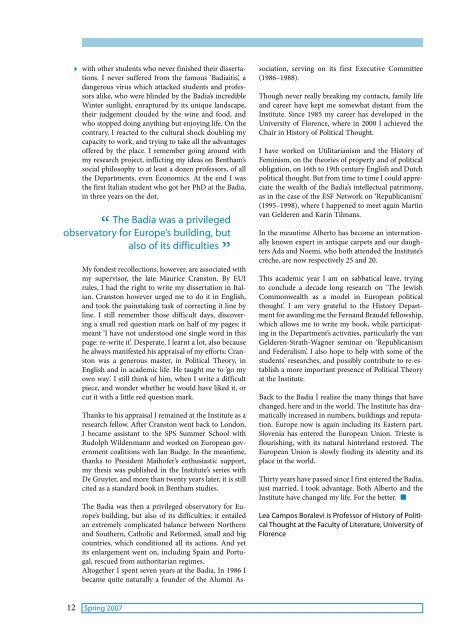Spring 2007 - European University Institute
Spring 2007 - European University Institute
Spring 2007 - European University Institute
Create successful ePaper yourself
Turn your PDF publications into a flip-book with our unique Google optimized e-Paper software.
}<br />
with other students who never finished their dissertations.<br />
I never suffered from the famous ‘Badiaitis’, a<br />
dangerous virus which attacked students and professors<br />
alike, who were blinded by the Badia’s incredible<br />
Winter sunlight, enraptured by its unique landscape,<br />
their judgement clouded by the wine and food, and<br />
who stopped doing anything but enjoying life. On the<br />
contrary, I reacted to the cultural shock doubling my<br />
capacity to work, and trying to take all the advantages<br />
offered by the place. I remember going around with<br />
my research project, inflicting my ideas on Bentham’s<br />
social philosophy to at least a dozen professors, of all<br />
the Departments, even Economics. At the end I was<br />
the first Italian student who got her PhD at the Badia,<br />
in three years on the dot.<br />
“ The Badia was a privileged<br />
observatory for Europe’s building, but<br />
also of its difficulties ”<br />
My fondest recollections, however, are associated with<br />
my supervisor, the late Maurice Cranston. By EUI<br />
rules, I had the right to write my dissertation in Italian.<br />
Cranston however urged me to do it in English,<br />
and took the painstaking task of correcting it line by<br />
line. I still remember those difficult days, discovering<br />
a small red question mark on half of my pages: it<br />
meant ‘I have not understood one single word in this<br />
page: re-write it’. Desperate, I learnt a lot, also because<br />
he always manifested his appraisal of my efforts: Cranston<br />
was a generous master, in Political Theory, in<br />
English and in academic life. He taught me to ‘go my<br />
own way’. I still think of him, when I write a difficult<br />
piece, and wonder whether he would have liked it, or<br />
cut it with a little red question mark.<br />
Thanks to his appraisal I remained at the <strong>Institute</strong> as a<br />
research fellow. After Cranston went back to London,<br />
I became assistant to the SPS Summer School with<br />
Rudolph Wildenmann and worked on <strong>European</strong> government<br />
coalitions with Ian Budge. In the meantime,<br />
thanks to President Maihofer’s enthusiastic support,<br />
my thesis was published in the <strong>Institute</strong>’s series with<br />
De Gruyter, and more than twenty years later, it is still<br />
cited as a standard book in Bentham studies.<br />
The Badia was then a privileged observatory for Europe’s<br />
building, but also of its difficulties: it entailed<br />
an extremely complicated balance between Northern<br />
and Southern, Catholic and Reformed, small and big<br />
countries, which conditioned all its actions. And yet<br />
its enlargement went on, including Spain and Portugal,<br />
rescued from authoritarian regimes.<br />
Altogether I spent seven years at the Badia. In 198 I<br />
became quite naturally a founder of the Alumni As-<br />
1 <strong>Spring</strong> <strong>2007</strong><br />
sociation, serving on its first Executive Committee<br />
(198 –1988).<br />
Though never really breaking my contacts, family life<br />
and career have kept me somewhat distant from the<br />
<strong>Institute</strong>. Since 1985 my career has developed in the<br />
<strong>University</strong> of Florence, where in 000 I achieved the<br />
Chair in History of Political Thought.<br />
I have worked on Utilitarianism and the History of<br />
Feminism, on the theories of property and of political<br />
obligation, on 1 th to 19th century English and Dutch<br />
political thought. But from time to time I could appreciate<br />
the wealth of the Badia’s intellectual patrimony,<br />
as in the case of the ESF Network on ‘Republicanism’<br />
(1995–1998), where I happened to meet again Martin<br />
van Gelderen and Karin Tilmans.<br />
In the meantime Alberto has become an internationally<br />
known expert in antique carpets and our daughters<br />
Ada and Noemi, who both attended the <strong>Institute</strong>’s<br />
crèche, are now respectively 5 and 0.<br />
This academic year I am on sabbatical leave, trying<br />
to conclude a decade long research on ‘The Jewish<br />
Commonwealth as a model in <strong>European</strong> political<br />
thought’. I am very grateful to the History Department<br />
for awarding me the Fernand Braudel fellowship,<br />
which allows me to write my book, while participating<br />
in the Department’s activities, particularly the van<br />
Gelderen-Strath-Wagner seminar on ‘Republicanism<br />
and Federalism’. I also hope to help with some of the<br />
students’ researches, and possibly contribute to re-establish<br />
a more important presence of Political Theory<br />
at the <strong>Institute</strong>.<br />
Back to the Badia I realize the many things that have<br />
changed, here and in the world. The <strong>Institute</strong> has dramatically<br />
increased in numbers, buildings and reputation.<br />
Europe now is again including its Eastern part.<br />
Slovenia has entered the <strong>European</strong> Union. Trieste is<br />
flourishing, with its natural hinterland restored. The<br />
<strong>European</strong> Union is slowly finding its identity and its<br />
place in the world.<br />
Thirty years have passed since I first entered the Badia,<br />
just married. I took advantage. Both Alberto and the<br />
<strong>Institute</strong> have changed my life. For the better. n<br />
Lea Campos Boralevi is Professor of History of Political<br />
Thought at the Faculty of Literature, <strong>University</strong> of<br />
Florence

















